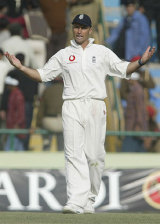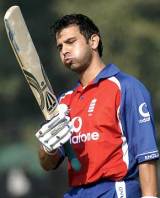Out of Asia
Eleven cricketers of Asian extraction who have played for England ... with varying degrees of success
|
|

|
The Prince of cricket's Golden Age, and arguably the first Asian superstar. Ranji (or "Smith" as he became known during his days at Cambridge), evoked images of eastern mysticism in all who watched him bat at the turn of the 20th century. Bringing supple wrists and exquisite timing to bear, he expanded the horizons of the game with the addition of such previously unconsidered shots as the late cut and the leg glance. After earning a blue in his final year at Cambridge, he made a century in his first game for Sussex in May 1895 (where he formed a legendary partnership with that other poster boy of the era, CB Fry), and the following year emulated that feat for England against Australia at Old Trafford, where his unbeaten second-innings 154 almost set up a famous victory.
Three decades later, Ranji's nephew trod a familiar path from Fenner's to Hove, and went on to play the first of his 12 Tests, against South Africa at Edgbaston, in 1929. Duleepsinhji lacked none of his uncle's artistry, and would arguably have finished up as the greater player had ill health not dogged his career and forced his premature retirement at the age of 27. At Hove in 1930 he made 333 against Northants in a single day's play, while his final Test average of 58.52 (995 runs in 19 innings) puts him 12th in the all-time list for players who played 10 or more matches. After retirement, Duleep joined the Indian foreign service in 1949 and became High Commissioner for India in Australia and New Zealand, before returning to India in 1953 to act as chairman of the Public Service Commission in the State of Saurashtra.
The father of India's legendary captain Mansur Ali Khan, Pataudi senior earned his own place in history as the only man to have played Test cricket for both England and India. He made his debut on England's controversial Bodyline tour in 1932-33, where he became the third consecutive India-born batsman to mark the occasion with a century. His participation on that trip, however, was short and sweet. He was dropped after just one more match, reputedly because he disagreed with Douglas Jardine's tactics, and left the tour early. Irresistible form for Worcestershire earned a recall for Australia's visit in 1934, but he only played the one Test, at Trent Bridge, which turned out to be the last of his England career. He was soon lined up as India's captain for their second tour of England in 1936, but he withdrew because of ill health, and it wasn't until 1946, at the age of 36, that he finally led his native country.
|
|

|
Born in Madras to an Indian father but raised in Essex, Hussain was a red-blooded Englishman when it came to his cricketing career. In his early days he was so ferociously determined to succeed, it was to the detriment of his relationships within the game, but later came responsibility, and the firebrand mellowed into a supreme statesman. In 1999 he inherited an England team at rock bottom, but the following year he galvanised them to beat West Indies for the first time in 31 years, before pulling off back-to-back triumphs in Pakistan and Sri Lanka in the winter of 2000-01. The zenith of his career, however, came with a team of rookies in India in 2001-02, when he improvised so superbly in a 0-1 defeat that he was lauded as England's best captain since Mike Brearley. After relinquishing the leadership in 2003, he bowed out on his own terms 12 months later, with a stunning match-winning hundred against New Zealand at Lord's.
When Ashley Giles went lame during England's tour of Pakistan and India in the winter of 2005-06, Patel was one of a handful of veteran spinners whose ears pricked up at the prospect of a recall - even though it was pushing 10 years since his last appearance for his adopted country. In the end his fellow forgotten man, Shaun Udal, was given the golden ticket, and once again Min was left to ponder what might have been. Born in Bombay in 1970, Patel made what should have been a dream debut against India at Edgbaston in 1996. Instead it turned into a nightmare. He bowled just 10 wicketless overs on a typical early-season greentop, lost his place for Lord's, then returned at Trent Bridge with everything to prove - only to run slap-bang into the newly formed triumvirate of Tendulkar, Ganguly and Dravid. No matter how well he performs for Kent, he'll never improve on his Test career average of 180.
After the 1999 World Cup debacle, England found themselves with a new captain, Hussain, and no full-time coach, because the nominated man, Duncan Fletcher, was still seeing out his contract with Glamorgan. Out of the confusion emerged Aftab Habib, born of Indian and Pakistani parents but educated at Millfield and Taunton Schools. He was a wildcard pick by the stand-in coach, Mike Gatting, a man who ironically had failed to pick Habib when he was on Middlesex's books as a rookie. Sadly Habib lasted just one more game before his technique - which had flourished for Leicestershire during their Championship-winning season the previous year - was picked apart by New Zealand's seamers. A return of 26 runs in three innings meant there would be no return, although he continued to impress for England A when given the opportunity. Habib joined Essex in a bid to reignite his international career, but by 2006 he had drifted out of the game.
Few sights better typified England's recent history of underachievement than Afzaal's leaping, whooping, air-punching celebrations at The Oval in 2001, after his one and only Test ... fifty. It was a classy innings, no doubt, and it had been made against the mighty Australians. But none of this exactly justified Afzaal's outburst. Australia, with the Ashes already secured, had compiled a monstrous 641 for 4 declared, and would go on to win their fourth Test out of five, by an innings and 25 runs. Afzaal was a curious blend of cockiness (the Aussies, for instance, were less than impressed by the flashy sponsored car in which he rocked up for his debut), and insecurity (Michael Atherton, playing his final series, recalled how the starry-eyed rookie kept addressing him as "Sir"). Afzaal never improved on his 54 in that Oval innings. He fell foul of Duncan Fletcher, for a perceived lack of fitness, on the subsequent tour of New Zealand. A devout Muslim who was born in Rawalpindi, Afzaal maintains strong links with his native Pakistan, and in October 2000 he led a team of teenagers to Lahore.
|
|

|
A silken strokemaker whose time seems to have been and gone without ever actually arriving. Despite a half-century of ODI appearances, two attractive hundreds, and the sort of fielding abilities that England's one-day team have been pining for, Solanki has never quite been trusted by the selectors. His longest unbroken spell in the side was his 13-match streak in 2003, but when that culminated in 11 runs in three traumatic matches against Bangladesh, he put paid to his prospects of partnering Marcus Trescothick in the long term. Though he's never come especially close to a Test debut, England still can't quite bear to pension him off in ODIs - only last month he captained the England Lions against West Indies at Worcester, and this week he was named in a provisional squad for the Twenty20 World Championships.
Recognition has been a long time coming for "Ace", who earned a county cap for Middlesex at the age of 17, but had to wait the best part of a decade to convert that into a Test cap. In between whiles he appeared for England in 15 ODIs and enjoyed some muted personal success, but slipped out of the reckoning after failing in the VB Series in 2002-03, the prelude to the World Cup. That appeared to be that: Shah won and lost the Middlesex captaincy as precocity gave way to unfulfilment, but an injury crisis on England's tour to India in 2006 gave his career a lifeline. He did everything he could in innings of 88 and 38 on Test debut at Mumbai as England won a scarcely credible victory. Though he was unable to repeat his one-off heroics 18 months later at Lord's, he seems finally, at the age of 28, to be ready to take his opportunities, as he showed this month with three classy ODI performances against West Indies.
Kabir Ali's solitary Test ended in a demoralising defeat, his maiden ODI was a total washout, and it is hard to imagine he'll get a chance to improve on his most recent appearance in England colours, at Headingley in 2006, when his six overs were smeared for 72 by Sanath Jayasuriya and Upul Tharanga. In the interim he's shown a big heart, not least at Bloemfontein in February 2005, when he overcame his nerves - and a wild full-toss no-ball - to seal a thrilling last-ball tie against South Africa. The highlight of his career arguably came during the one-day series in Pakistan in December 2005, when England played a day/night match in his home town, Rawalpindi. As the crowd became honorary Brits for the night, Kabir claimed 2 for 51, restricting Pakistan to 210, then followed up with an unbeaten 39 from No. 10. It wasn't, alas, enough to secure a win. Despite consistent efforts for Worcestershire, including an eight-wicket haul in the 2007 championship, his international days appear to be over.
Mahmood was born and raised in Bolton - a fact which somewhat undermined the cries of "traitor" that greeted him at Headingley when he turned out for England against his father's homeland, Pakistan, in 2006. A cousin of the Olympic boxer, Amir Khan, Mahmood is genuinely quick, as Andrew Flintoff discovered when he was pinned on the shoulder by a beamer in the Old Trafford nets in 2003. But he also tends towards the erratic. Either way, he was mishandled by the England management on the Ashes tour in 2006-07. He was dropped when he should have played (at Brisbane for the series opener, after he had contributed to three home Test victories), and then recalled for the last two Tests, where he struggled to regain his form of the summer. He has not featured since in England's plans, but he is 25 and his chance should come again.
Andrew Miller is UK editor of Cricinfo